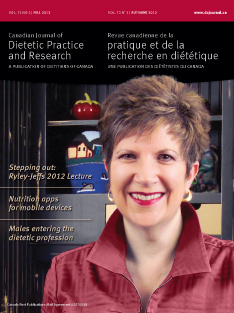Abstract
Purpose: Determinants of self-efficacy related to food preparation using store-bought food were examined in women belonging to the Atikamekw Nation. Also examined was whether self-efficacy was associated with household food insecurity.
Methods: A cross-sectional survey was conducted with 107 women responsible for household food supplies. Two selfefficacy scores were calculated, one for healthy food preparation and one for food preparation in general. Household food insecurity was measured with an adapted version of the United States Food Security Core Module. The other variables were household composition, income sources, food supplies, tobacco use, participants’ health status, and lifestyle and sociodemographic characteristics. Multiple linear regression was used to analyze associations between self-efficacy and household food insecurity in 99 participants.
Results: Severe household food insecurity was associated with significantly lower healthy food preparation scores in Atikamekw women. Other associated variables were food supplies, marital status, alcohol consumption, weight status, and understanding of the native language.
Conclusions: Application of the concept of self-efficacy contributes to a better understanding of the factors influencing food preparation in Atikamekw women. In this study, self-efficacy in healthy food preparation was linked to food insecurity and obesity, particularly in the most serious cases. Efforts to improve diet will require not only behavioural interventions, but public policies.
Résumé
Objectif: Les déterminants de l’autoefficacité en lien avec la préparation des aliments à l’aide d’aliments achetés en magasin ont été étudiés chez des femmes de la nation attikamek. De plus, nous avons examiné si l’autoefficacité était associée à l’insécurité alimentaire des ménages.
Méthodes: Une enquête transversale a été menée auprès de 107 femmes responsables de l’approvisionnement alimentaire pour le ménage. Deux scores d’autoefficacité ont été calculés: l’un pour la préparation d’aliments santé et l’autre pour la préparation des aliments en général. L’insécurité alimentaire des ménages a été mesurée à l’aide d’une version adaptée du Food Security Core Module des États-Unis. Les autres variables étudiées étaient la composition du ménage, les sources de revenus, la disponibilité des aliments, le tabagisme, l’état de santé des participantes, le style de vie et les caractéristiques sociodémographiques. Une régression linéaire multiple a été utilisée pour analyser chez 99 participantes les associations entre l’autoefficacité et l’insécurité alimentaire des ménages.
Résultats: Une grave insécurité alimentaire dans le ménage était associée à des scores significativement moins élevés pour la préparation d’aliments santé chez les femmes attikameks. En outre, une association a été trouvée avec d’autres variables, à savoir la disponibilité des aliments, l’état matrimonial, la consommation d’alcool, le statut pondéral et la compréhension de la langue autochtone.
Conclusions: L’application du concept d’autoefficacité contribue à mieux comprendre les facteurs qui influencent la préparation des aliments chez les femmes attikameks. Dans cette étude, l’autoefficacité relative à la préparation d’aliments santé a été associée à l’insécurité alimentaire et à l’obésité, particulièrement dans les cas les plus graves. Pour améliorer l’alimentation, il sera ainsi non seulement nécessaire de procéder à des interventions comportementales, mais aussi de mettre en place des politiques publiques.



